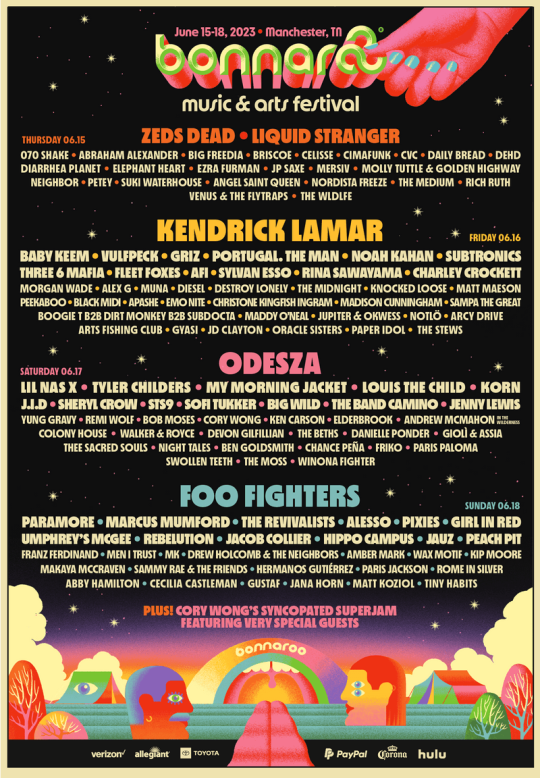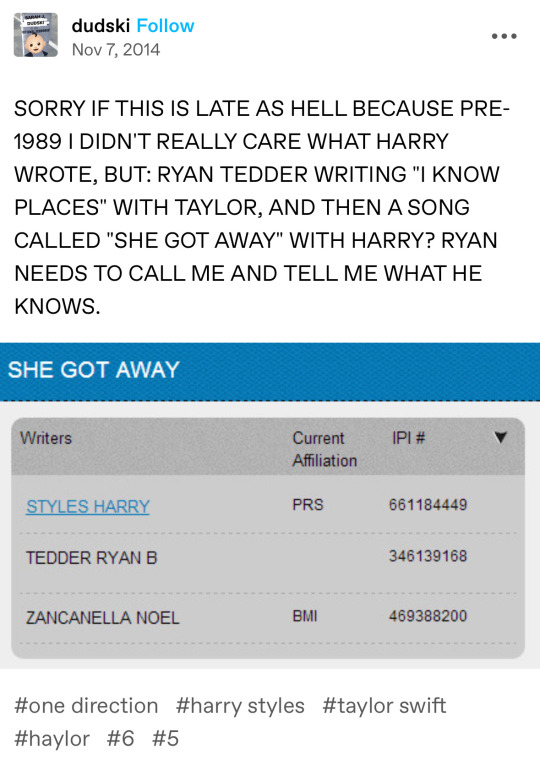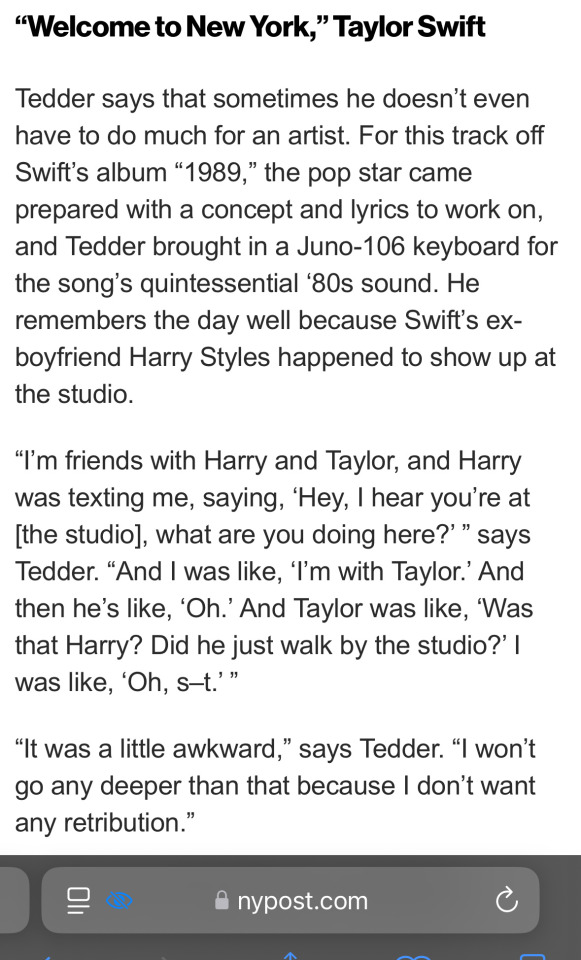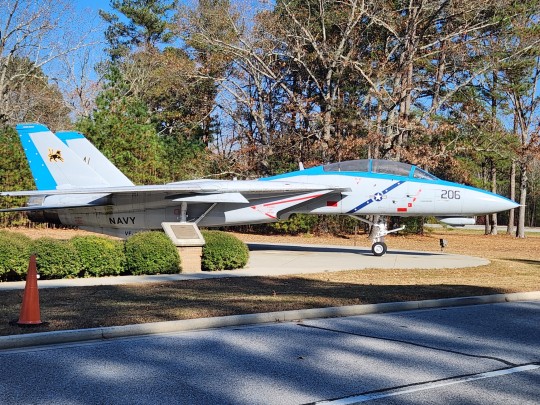#Manchester Tennessee
Explore tagged Tumblr posts
Text
Bonnaroo 2025: A Star-Studded Lineup

The highly anticipated Bonnaroo Music and Arts Festival has revealed its 2025 lineup, featuring an exciting mix of genres and top-tier talent. Headliners include Tyler, the Creator, Olivia Rodrigo, Luke Combs, and Hozier, promising a diverse musical experience. Held annually in Manchester, Tennessee, Bonnaroo is known for its eclectic lineup, blending rock, hip-hop, electronic, and more.
This year's festival will take place from June 12-15, with tickets already on sale. Fans can expect a vibrant atmosphere, with multiple stages and a variety of activities beyond the music, including art installations, food vendors, and wellness programs.
For more details on the full lineup and ticketing information, visit the following sources:
The Tennessean
Rolling Stone
Billboard
#Bonnaroo 2025#Tyler the Creator#Olivia Rodrigo#Luke Combs#Hozier#Bonnaroo lineup#music festival#Manchester Tennessee#live performances#festival tickets#music events.#bonnaroo
1 note
·
View note
Text




Some bonnaroo selfies
#bonnaroo#manchester tennessee#makeup#festival#live music#kendrick lamar#fleet foxes#why am i so cute
0 notes
Text
i will prob never visit the us unless for work reasons bc the thought of being there scares me more than the thought of flying there. i would love to go though... im just scared
#txt#i get scared bad things will happen to me no matter where i go (knife crime knife crime knife crime)#i think abt the acid attavks from a few years ago every time i step off the train in a city#and the manchester bombings#the us to me just in my head is everything in the uk with guns as well and 10000000000x more regular and horrible#id love to go to your museums and stuff though... and go on tours and shit. visit the cool places... such a big place id love to somehow#visit every state but obviously i never will... maybe some day ill go to cali or florida or fucking... idk whats another state#tennessee#but only for work not for leisure#<- that being said my dad wants to go to ny on his 50th and if he wants me to join then well. i wouldnt stop him#hmmm#i could also get a uni course that allows a year studying in another country i could always pick the us#i can make opportunities for myself#anyway#RAAAHHHHHHH I WISH A TRIP TO THE US FOR HISTORY WASNT IMPOSSIBLE... SMIFFLE :( I DONT WANT TO GO TO 5 GUYS I WANT TO GO TO THE UNITED STATES#OF AMERICA
7 notes
·
View notes
Text
On June 24, 1934, a white mob in Manchester, Tennessee, lynched a 35-year-old Black man named Richard Wilkerson after he allegedly slapped a white man who assaulted a Black woman at an African American dance.
Mr. Wilkerson had been at a Black church festival with his wife when several white men who had been drinking entered the event. When the white men began accosting some of the Black women in attendance—including Mr. Wilkerson’s wife—Mr. Wilkerson intervened and allegedly slapped one of the men.
Soon after, the group of white men went to Mr. Wilkerson’s home and began destroying all of his belongings. The mob “tore up everything he had, tore it literally all to pieces,” the sheriff later told newspapers.
Unsatisfied, the white men then returned to the church dance where they found and grabbed Mr. Wilkerson, along with an unidentified young Black man. The mob drove the two men roughly 15 miles from town, where they shot Mr. Wilkerson several times before mutilating his body. The young Black man who was with Mr. Wilkerson was also shot but managed to escape.
Among the eight men who lynched Mr. Wilkerson was a 14-year-old teenager who later shared the names of the other members of the mob with officers. Several months later, the eight men were convicted of manslaughter. One newspaper noted it was the first case on record in Tennessee where white men had been convicted for lynching a Black person.
Mr. Wilkerson was one of at least 236 documented lynching victims between 1865 and 1950 in the state of Tennessee—and one of eight people lynched in Coffee County alone. To learn more about the history of racial terror lynching, read EJI’s report, Lynching in America.
#history#white history#us history#Black history#am yisrael chai#jumblr#republicans#democrats#Manchester#Tennessee#Richard Wilkerson#woman#white woman#white man#Black woman#christian#white christian#Black christian#church#Black church#white men#men
4 notes
·
View notes
Text
Bonnaro with Zeds Dead, Kendrick Lamar, Odesza and Foo Fighters

15-18 June 2023, Manchester, TN
More Information at https://www.bonnaroo.com/
Want more festivals? Check out our Festival Calendar for a complete list.
#TaBS Magazine#Tour and Backstage Stories#Bonnaroo#Music Festival#Manchester#Tennessee#Foo Fighters#Odesza#Lil Nas X#Paramore#Marcus Mumford#Kendrick Lamar#Korn#Zedd Dead#Portugal The Man#AFI
2 notes
·
View notes
Text
Luke Combs to Perform at Bonnaroo in Manchester
The 2025 Bonnaroo Music & Arts Festival lineup is here, and it contains some heavy hitters. Country superstar Luke Combs (Photo by Zack Massey), pop icon Olivia Rodrigo, and rock phenom Hozier are included among the headliners for this year’s festival, set for June 12-15 in Manchester. The annual festival, which features music from all genres, sees the Coffee County town overtaken by more than…
0 notes
Text
We would love to go RV camping at Bonnaroo down in Manchester, Tennessee.
0 notes
Text
Experience Unparalleled Luxury at Manchester, Tennessee's Finest Hotel

The luxury hotel in Manchester, Tennessee, is tucked away in the heart of the city and welcomes guests seeking an extraordinary experience. It is a refuge of luxury and comfort. The instant you enter its imposing door, you'll be transported to a world of luxury, sophistication, and personalized care, making for an exceptional stay.
Experience Extravagance: The Ultimate in Luxury
This magnificent hotel is a brilliant symbol of affluent life, with an abundance of extravagant features and services to please even the most discerning guests. The architecture combines modern aesthetics with traditional charm to create a welcoming and opulent ambience.
Each guest room has been deliberately designed to reflect a seamless fusion of modern style and historic allure. It is a refuge of comfort. To ensure that every need is met with the highest care, the rooms are opulently outfitted with luxurious furnishings, quality bedding, and cutting-edge technology.
Redefining Exquisite Dining: A Culinary Journey
The culinary delicacies provided to visitors at this luxury hotel in Manchester, Tennessee, are many. The on-site restaurant offers a remarkable dining experience with top-notch chefs that expertly craft a symphony of flavors to suit every palate. Every meal is a work of art that entices the palate, whether it is a gourmet classic or a cutting-edge culinary creation.
Booking Effortlessly: Your Passport to Special Moments
You may easily plan a trip to this luxurious hotel in Manchester, Tennessee. You have the ability to instantly reserve the lodgings of your desires thanks to the hotel's user-friendly online reservation system. You can tailor your stay to your preferences by selecting from a range of room categories and package choices, ensuring that your trip is everything you had dreamed.

Exploring Manchester: Beyond the Luxurious Home
The hotel's amenities are undoubtedly enticing, but Manchester, Tennessee's charm may be found elsewhere. Travel nearby locations to fully experience the culture of the area. Go on tours outside to take in the area's breathtaking beauty or visit historical structures and museums to learn more about the area's intriguing past.
Commitment to Excellence: Your Memorable Stay Is Awaiting
From the moment you arrive until the time of your departure, the five-star hotel in Manchester, Tennessee, is committed to giving you an outstanding experience. Thanks to the dedicated staff members, who are known for their gracious hospitality, your stay will be excellent.
Whether you're seeking for a weekend getaway, a romantic retreat, or a base to explore Manchester, Tennessee's attractions, this luxury hotel promises to be more than just lodging—it's an expression of elegant living, first-rate service, and priceless memories.
Last but not least, the lavish Hotel Reservations in Manchester Tennessee, stands as a monument to grandeur in the midst of a little town. With its sumptuous accommodations, opulent amenities, and unwavering commitment to visitor enjoyment, it offers an opportunity to indulge in life's finer things. Make a hotel reservation as soon as possible in Manchester to start living in unrivaled luxury and sophistication.
#lodging#hotel#budget hotel reservation in tennessee#budget hotel reservation in manchester#bestroombookinginmanchestertn
0 notes
Text
Devesh Arvind Patel

Devesh Arvind Patel is a successful young entrepreneur who is all geared up to break new records in the hospitality industry and beyond in the US. He shows great character and zeal in leading his dynamic team. With a strong academic record, he is witty and intelligent to capitalize on the efforts of his father.
Devesh Arvind Patel is one of the rising stars in the hospitality industry. He is an exemplary leader who is firm in his values and ideals and leads his team with great charisma and leadership skills.
Here are the 3 best qualities of Devesh Arvind Patel that make him stand out as an exceptional leader:
1. Eminent leadership
The values entrenched in Devesh Arvind Patel make him an ideal leader. His team in both India and US is a potent mix of both seasoned experts and youngsters gushing with innovative ideas. He has struck this most critical balance in bringing the best out of both worlds. The outcomes of ACW Circle are now a blend of both expertise and innovation.
2. Leads by example
Devesh Arvind Patel is young and dynamic and hence he spreads his positivity everywhere he is present. His hard work and determination are impressive, and it encourages and motivates his team to work as hard as him.
3. Brave & fearless
Devesh Arvind Patel is a brave youngster who takes educated and calculated risks in his business ventures. He has fully realized that the greater the risk involved, the greater returns can be cherished. His pivotal business decisions, taken at crucial junctures, have paved the way for the success of ACW Circle, Lx Hotel, and Arkashya Tech Solution.
Devesh Patel is one of the highly efficient and qualified youngsters who is all set to lead ACW Circle to greater glory.
#Devesh Patel#Devesh Arvind Patel#DeveshPatel Manchester TN#DeveshPatel#Devesh Patel Manchester Tennessee
0 notes
Text
Arvind Mohanlal Patel
Arvind Mohanlal Patel is a leading hotelier in the United States. He is one of the industry leaders and pioneers in the hospitality industry. He is the owner of the Lx Hotel located in Manchester, Tennessee, the only 5-star rated hotel in a vicinity of 500 miles.
Alex Patel’s passion and interest in the hospitality industry has made him a name to reckon with. His hotel is the recipient of the Traveler's choice award from TripAdvisor.
Here are the 3 key traits and characteristics that make Arvind Mohanlal Patel a leader par excellence:
1. 30 years of experience
With over 3 decades of experience and expertise in the hospitality industry, the success of Lx Hotel, Manchester, TN is the result of Alex Patel’s hard work, commitment, and dedication. It is the only hotel with VIP access in a radius of 200 miles. His expertise in hotel management has been a primary driver in the launch of MyHotel AI – the only AI-based customizable Property management System for the hospitality industry. This successful application is handy, smart, and highly effective and hence is acclaimed by the big names in the US hospitality industry.
2. Visionary Leader
Arvind Mohanlal Patel is an extraordinary leader. His successful ventures, ACW and Arkashya Tech Solution are standing examples of his leadership skills. These digital marketing companies are leading the league in both US and India respectively. The companies were able to fetch 30+ customers within a month of their launch in their respective countries.
3. Humane, humble & genuine
Alex Patel is a genuine and empathetic person. He leads his team in the US and India with great zeal. He is a staunch believer in teamwork and is usually the first person to address the concerns of his employees. He ensures that the employees get a perfect work-life balance and are renumerated adequately for their efforts and hard work.
#CEO#digital marketing#digital marketing agencies#hotelier#Manchester#Tennessee#hospitality#hotel#branding agencies
0 notes
Text
Manchester, Tennessee's Maegan Hall sues La Vergne Police Department, Chip Davis, Lewis Powell, Ty McGowan
Maegan Hall, 26, of Manchester, Coffee County, Tennessee, United States is originally from Chattanooga, Hamilton County, Tennessee. She and Jedidiah Hall, 28, got married in November 2018.
youtube
View On WordPress
0 notes
Text


Hayley Williams durante la presentación de Paramore en el Festival de Música y Arte Bonnaroo en Manchester, Tennessee (08/06/2013).
#hayley williams#hwilliamsedit#paramore#paramoreedit#dailywilliams#public appearance#2013#celebs#celebrities#flawlesscelebs#flawlessfemale#flawlessbeautyqueens#femaledaily#glamoroussource#thequeensofbeauty#breathtakingqueens#dailymusicsource#dailymusicqueens#dailymusicians#popularcultures#usermusic#dailymusicedit
391 notes
·
View notes
Text
direct ticket links
(because danandphiltour.com inconveniently doesn't open each link in a separate tab and removes links from "sold out" shows that can and still do have tickets available)
Europe (September 2024):
Antwerp, Belgium
Copenhagen, Denmark
Berlin, Germany
Warsaw, Poland
Frankfurt, Germany (Eventim and venue. venue has better seats available)
Stockholm, Sweden
Oslo, Norway (refresh or switch languages at the bottom of the page if it shows error)
Helsinki, Finland
USA/Canada (October-November 2024):
Seattle, Washington
Seattle, Washington
Portland, Oregon
Vancouver, Canada
Oakland, California
Phoenix, Arizona
San Diego, California
Los Angeles, California
Salt Lake City, Utah
Denver, Colorado
Kansas City, Missouri
Grand Prairie, Texas*
Austin, Texas
St. Louis, Missouri*
Detroit, Michigan
Akron, Ohio
Indianapolis, Indiana
Milwaukee, Wisconsin
Minneapolis, Minnesota
Chicago, Illinois
Toronto, Canada
Philadelphia, Pennsylvania
New York City, New York
Tysons, Virginia*
Tysons, Virginia*
Atlanta, Georgia
Tampa, Florida
Orlando, Florida
Fort Lauderdale, Florida
Durham, North Carolina
Nashville, Tennessee
Boston, Massachusetts
Reading, Pennsylvania
Red Bank, New Jersey
*Grand Prairie - near Dallas, Tysons - near Washington DC, St. Louis - near Chesterfield
Australia/New Zealand (December 2024):
Brisbane, Australia
Sydney, Australia
Sydney, Australia
Perth, Australia
Melbourne, Australia
Adelaide, Australia
Auckland, New Zealand
UK + Europe (January-February 2025):
Birmingham, UK
Cardiff, UK
Cardiff, UK
Plymouth, UK
Brighton, UK
Brighton, UK
Birmingham, UK
London, UK
London, UK
London, UK (matinee)
London, UK
Newcastle, UK
Manchester, UK
Manchester, UK
Dublin, Ireland
Belfast, UK (venue and ticketmaster)
Glasgow, UK
Glasgow, UK
Amsterdam, Netherlands
Reykjavík, Iceland
76 notes
·
View notes
Text


Ryan Ross performs onstage during Bonnaroo 2010 at Troo Music Lounge on June 11, 2010 in Manchester, Tennessee
(Photo by FilmMagic/FilmMagic)
#ryan ross#the young veins#post panic! at the disco obviously i just want to clog up the tag with ryan#george ryan ross iii
296 notes
·
View notes
Note
Do you have an analysis to She Got Away?
Thank you for this question. I think if she got away as a Haylor song that had some details changed to make it a generic 1D song.
It is likely from February 2014 - fans first posted it was registered in November 2014 (after it didn’t appear on Four), although the band recorded it. While making WTNY and I Know Places with Taylor in Conway Studios he also saw Harry there (Four was in production)



Ryan has specified at least 4 other writing meetings with them:
29 January 2012 - W hotel in Westwood LA - to Zach Sang, that sounded early. 1D stayed at the W in 2012. No mention of a song just annoyed about the similar band names.
19 April 2013 - Manchester - to Capital FM - Right Now (OneRepublic was in London, One Direction in Manchester and Midnight Memories was in production. ...also after that date is when he went back to the US to get the Peace ring and Taylor wrote I Wish You Would). He says he wrote 'something else with one of them' presumably Harry as Right Now refers to CBBH and Harry loved it.
February 2014 - Conway Studios LA - to New York Post 2019 - when Taylor and Harry were there. The rest of the band was in the UK. I think this is when She Got Away was likely written. Harry wrote it with Ryan Tedder and Noel Zancanella, both who worked on Welcome to NY. Ryan also said he saw Harry and Taylor at the studio then (I know places & welcome to NY from the same sessions, we also know Harry was there when JABOYH was written while hanging around Conway in January 2014. Style, Shake it off were also recorded then. It’s widely reported this song was for Four, fan first posted about it being registered in November 2014 after Four released without it.
London hotel - to Ryan Seacrest - Solo Harry, he talked about him traveling with no entourage.
youtube
She Got Away Lyrics
Jennie in She got Away seems like a composite rather than an actual person. She is enigmatic, contradictory and mysterious. She is very much of the Diana/Georgia Rose archetype who is a vessel that 1D's fans could see themselves in or aspire to be. Harry's love of older music is clear, it's very Bob Dylan-inspired storytelling through characters, wandering and the places named.
Verse One: Liam & Harry] I met this girl the other night On the streets of New Orleans She said I'm trying to find myself On the run from Tennessee She had a diamond in one ear And patches on her jeans Oh yeah, oh yeah, the girl she got to me
The first verse reminds me of Taylor in the 'On the run from Tennessee' especially if the song is written in the same session as Welcome to New York, she was on the run from country music, the success of Red and her home of Tennessee.
The 'Diamond in one ear and patches on her jeans 'is a perfect description for this transitional era of Taylor - on the success of her last Country-pop album singing about moving to New York for a complete pop album. This line is very much Taylor at that time. It is a brilliant line as it works for the 1D listener who is an evolving young woman.
Jennie has a way with words Yeah, she always speaks in quotes She said that she ain't ever Met a man like me before She told me she just won a trip to Mexico Oh yeah, oh yeah On the radio Oh yeah, oh yeah Someday she will go
She has a way with words is a girl who writes, speaks in quotes is someone who writes heavily in references and metaphor... sounds like someone we know. 'She said she ain't never met a man like me before / she won a trip to Mexico' this sounds like the intended listener is fan fiction writers, coming up with the scenario where they meet Harry.
The 'never met anyone like me' line to me has me wondering how many of Taylor's Exes would come back to the studio to hear her next album be recorded and spend days collaborating on writing love songs about her while she does.. I think that's still a list of 1.
[Chorus: All] When I close my eyes I swear that I can see her Then they open wide And she’s a world away And I swear she’s mine So does every man who meets her Oh yeah, oh yeah She’s the girl that got away Oh yeah, oh yeah But she’s coming back someday
The chorus has Harry and the muse separated by the world, he is dreaming of her, it fits nicely with the fanfiction listener. There's a nice call out to 'half the world away'.
The 'so does every man who meets her' reminds me of Fool's Gold's 'you turn it on for everyone you meet' but here it is loving. And a nice 'she's coming back someday' adorable for writing this the same week as Style's 'Everytime we crash down we come back again'
[Verse Two: Harry & Niall] Jennie likes a coffee late at night It helps her sleep She doesn't cook but She's got a million recipes She's got a tattoo Doesn't know what it means Oh yeah, oh yeah When she was with me
Coffee late at night - need I say more?? The sleep also is a nice call back to Little Things. Jennie is chaotic and sounds hyperproductive... yeah...
The tattoo is cute, a clear 'not Taylor or anyone he'd dated.' unless the tattoo is on him and she doesn't know who it was for. 'when she was with me'
[Bridge: All] What I feel, what I feel, I feel for her Ain't going away What I feel, what I feel, I feel for her Ain't going away What I feel, what I feel, I feel for her Ain't going away What I feel, what I feel, I feel for her Feel for her, feel for her
The bridge is a nice resolution, Harry has made a decision he is committed. It is so much more hopeful than JALBOYH and WDBHG from the same sessions.
20 notes
·
View notes
Text
Spotted far above the high tide line outside Manchester, Tennessee at Arnold AFB's gate.





92 notes
·
View notes